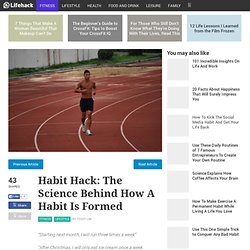

This is Why You Don't SUCCEED - One of the Best Motivational Speeches Ever. What's the ultimate way to defy depression, disease and early death? Exercise. Are you sitting comfortably?

Bad idea. Stand up and walk around the house. Leave your desk and jog down the office stairs. Even better – jog up the stairs. If it’s lunchtime, go and join a yoga class or head for the shops on foot. Hardly a day goes by without a new piece of research flagging up the benefits to our physical and mental health of getting more active. Getting off your backside and moving about, preferably a bit vigorously some of the time, will stave off heart disease, strokes, cancer and diabetes.
We have the sitting disease. If exercise was a pill, it would be the biggest blockbuster in the history of medicine. We weren’t built to sit in front of a computer, a TV screen and a steering wheel. “It is what we were made to do,” says Nick Cavill of Oxford University’s department of public health. “Our bodies are still stuck in neolithic times, while our minds are in the 21st century.”
Growth Mindset. Why You’re Better Off With a Hard-Working Child than a Smart One. Fixed vs. Growth: The Two Basic Mindsets That Shape Our Lives. “If you imagine less, less will be what you undoubtedly deserve,” Debbie Millman counseled in one of the best commencement speeches ever given, urging: “Do what you love, and don’t stop until you get what you love.
Work as hard as you can, imagine immensities…” Far from Pollyanna platitude, this advice actually reflects what modern psychology knows about how belief systems about our own abilities and potential fuel our behavior and predict our success. Much of that understanding stems from the work of Stanford psychologist Carol Dweck, synthesized in her remarkably insightful Mindset: The New Psychology of Success (public library) — an inquiry into the power of our beliefs, both conscious and unconscious, and how changing even the simplest of them can have profound impact on nearly every aspect of our lives.
One of the most basic beliefs we carry about ourselves, Dweck found in her research, has to do with how we view and inhabit what we consider to be our personality. A Navy SEAL Explains 8 Secrets To Grit And Resilience. Sometimes you just want to quit.

You know you shouldn’t but nothing seems better than crawling back into bed and hiding under the covers. (I am there right now, actually, with my laptop.) The emerging science of grit and resilience is teaching us a lot about why some people redouble their efforts when the rest of us are heading for the door. Research is great, but it’s always nice to talk to someone who’s been there firsthand, and to see how theory holds up against reality.
Habit Hack: The Science Behind How A Habit Is Formed. “Starting next month, I will run three times a week” “After Christmas, I will only eat ice cream once a week maximum” How many of you have tried to start a new habit and failed?

Forming a new habit is not an easy task, yet we all know that in order to improve ourselves, creating a new habit (or breaking a bad one) is crucial and unavoidable. As people who love to learn new ways to “hack” our lives, i believe that we need to break down the mechanic of how a habit is created in order to successfully create a new habit. Charles Duhigg (a Pulifzer-prize winning reporter) wrote a very good book that breaks down the mechanics of habit creation, it is titled “The Power of Habit” (Published in 2012). He argues that habit creation involves three components: 1. The cue is the trigger behind the behavior.
Dan Pink: The puzzle of motivation. NurtureShock, by Po Bronson and Ashley Merryman. How to raise a brilliant child without screwing them up. Where does the drive to succeed come from?

And if it results in exceptional achievement (as defined by external norms such as power, status and wealth) does that have to go hand in hand with being a troubled, agonised person? The latest evidence suggests that genes play little part – see box below – and that nurture is critical, whether it be carrot or stick. In my case, for instance, purely because I was the only boy with three sisters, I was treated completely differently by my father. Despite my repeated failure at school, he constantly encouraged me to see myself as clever and I eventually did OK.
He gave no such encouragement to my sisters in their academic careers (fortunately, my mum did). I would go so far as to say that, had I been swapped at conception with one of my sisters, she would be writing these words. At the simplest level, performance is nurtured through teaching – for good or ill. Then there is modelling. The love bit is obvious enough. @oliverj_psych Oliver James Do … Sir Ken Robinson's New Book on Finding your Passion. Optimising the Performance of the Human Mind: Steve Peters at TEDxYouth@Manchester 2012.